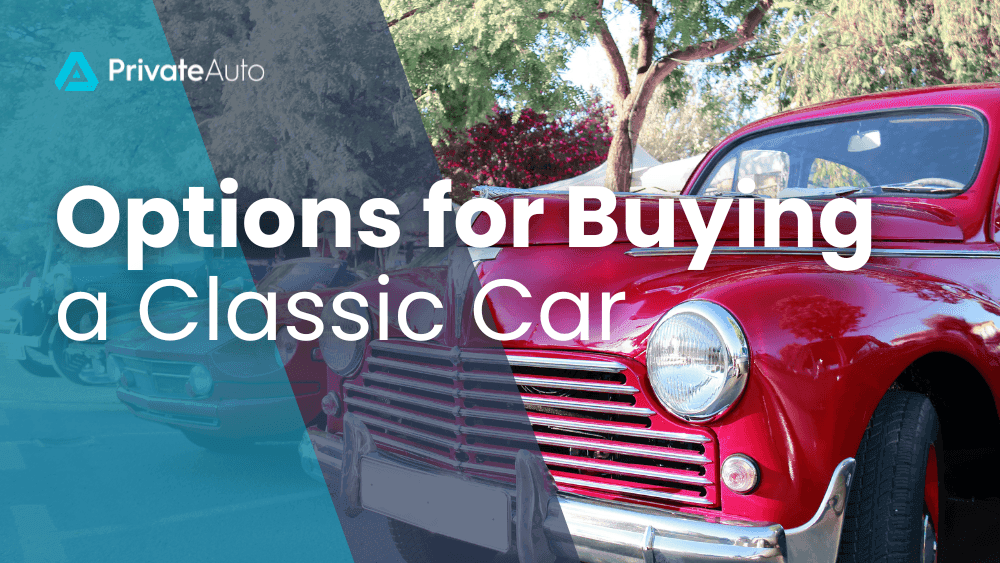Options for Buying a Classic Car
Buying a classic car is a bucket list goal for many auto enthusiasts. From the stately beauty of cars from the 30s and 40s to the sheer power of 70s muscle cars, classic automobiles have a lot to offer. Owning a classic car also means that you'll own a working piece of automotive history, and there are very few feelings in the world that can compare with that.
If you're in the market for a classic car, there are several options for finding and buying your dream automobile. While all of these options are workable, they each come with their own set of pros and cons. Here's what you should know about your options for buying a classic car before you start your search.
If you're in the market for a classic car, there are several options for finding and buying your dream automobile. While all of these options are workable, they each come with their own set of pros and cons. Here's what you should know about your options for buying a classic car before you start your search.
Buy From a Specialized Dealer
As with other vehicle niches, there are dealers that specialize in classic and antique vehicles. The main advantage of buying from one of these dealerships is that you can access a large selection of classic cars all in one place. Rather than having to track down classic cars one by one, you can shop through a collection of cars that has been assembled over several months or years by a professional buyer. As with ordinary dealerships, specialty classic car dealerships also list cars at a higher price than they really expect to get. If you're comfortable with negotiations, you can get a good deal on your car at one of these businesses. Working with a dealership also has a convenience factor, as you won't have to deal with problems like replacing lost car titles or checking for liens on vehicles.
At the same time, there are some disadvantages to working with a classic car dealer. First and foremost, dealers act as middlemen in the transaction and need to turn a profit to stay in business. As a rule of thumb, you'll end up paying about 10 percent more through a dealer than you would by buying the same car from a private seller. Dealers also won't have the in-depth knowledge of the car's history that a long-time owner will, meaning you're assuming a certain amount of risk when you buy from a classic car lot.
At the same time, there are some disadvantages to working with a classic car dealer. First and foremost, dealers act as middlemen in the transaction and need to turn a profit to stay in business. As a rule of thumb, you'll end up paying about 10 percent more through a dealer than you would by buying the same car from a private seller. Dealers also won't have the in-depth knowledge of the car's history that a long-time owner will, meaning you're assuming a certain amount of risk when you buy from a classic car lot.
Attend a Classic Car Auction
Like classic car dealerships, auctions bring several desirable cars together in a single place. Most auctions are also somewhat specialized, meaning you'll find curated collections of muscle cars, imported sports cars, or other specific niches. Besides the quality of the selection, attending a classic car auction is a fun experience that any automotive enthusiast is sure to enjoy.
The downside to buying a classic car at an auction is the fact that you'll rarely find budget-friendly deals. Most of the cars that hit the auction block will be in extremely good condition or fully restored. Many will also be especially valuable due to rarity, originality, or some other factor. If the bidding is competitive for the car you want, the final price can also go well above the projected auction value. For these reasons, you shouldn't go into an auction expecting to spend anything less than about $20,000 for a classic vehicle.
The downside to buying a classic car at an auction is the fact that you'll rarely find budget-friendly deals. Most of the cars that hit the auction block will be in extremely good condition or fully restored. Many will also be especially valuable due to rarity, originality, or some other factor. If the bidding is competitive for the car you want, the final price can also go well above the projected auction value. For these reasons, you shouldn't go into an auction expecting to spend anything less than about $20,000 for a classic vehicle.
Consider a Private Party Sale
A private party sale is usually the best way to buy a classic car. By buying directly from the seller, you can get around dealership and auction house fees that add significant amounts of money to the car's price. In most cases, you'll also be dealing with someone who has owned and maintained the car for years. Private sellers know every in and out of their classic car's history. By asking the right questions, you can get a much better idea of exactly what you're buying and how the car has been maintained than any dealer or auctioneer could ever give you.
The only real downside of buying from a private party is the extra legwork involved. To find the car you want, you'll have to scour listing sites and classified ads one by one. To streamline your search, take advantage of sites like Hemmings and Craigslist that allow you to browse listings from many private sellers at once. The advantages in terms of price and information about the car usually make this process worthwhile, but it will probably take you a bit longer to find the perfect car if you're buying privately.
The only real downside of buying from a private party is the extra legwork involved. To find the car you want, you'll have to scour listing sites and classified ads one by one. To streamline your search, take advantage of sites like Hemmings and Craigslist that allow you to browse listings from many private sellers at once. The advantages in terms of price and information about the car usually make this process worthwhile, but it will probably take you a bit longer to find the perfect car if you're buying privately.
Look For Classics at Regular Dealerships in Your Area
A final approach to buying a classic car is to look for classics at ordinary dealerships around your area. Although most used cars on dealerships lots will be newer models, you'll still see classics turn up every so often. Classics usually arrive at dealerships because the owner chose to trade in an old car rather than going through the process of selling privately. These classics at regular dealerships are few and far between, but they go through the same inspection process as any other car on the lot. Buying a one-off classic at a regular dealership may also make it easier to finance your classic car since you will likely be able to get a car loan through the dealership's financing office.
The same disadvantages that come with specialized dealerships also apply to ordinary dealerships. Higher prices and limited vehicle histories will be just as common at your local Ford or Chevy dealerships as they will at a classic car lot. Don't let these issues stop you from looking, though. You might just discover a hidden gem by perusing the pre-owned inventory page on a local car dealer's website.
Whatever option you choose for buying a classic car, it's important to do your research and ask the right questions before putting your money down. If possible, have the car thoroughly inspected to be sure you aren't buying something with unknown mechanical issues. If you're buying a classic automobile for the first time, it's also a good idea to bring a knowledgeable friend with you to provide advice and act as a second set of eyes.
The same disadvantages that come with specialized dealerships also apply to ordinary dealerships. Higher prices and limited vehicle histories will be just as common at your local Ford or Chevy dealerships as they will at a classic car lot. Don't let these issues stop you from looking, though. You might just discover a hidden gem by perusing the pre-owned inventory page on a local car dealer's website.
Whatever option you choose for buying a classic car, it's important to do your research and ask the right questions before putting your money down. If possible, have the car thoroughly inspected to be sure you aren't buying something with unknown mechanical issues. If you're buying a classic automobile for the first time, it's also a good idea to bring a knowledgeable friend with you to provide advice and act as a second set of eyes.


